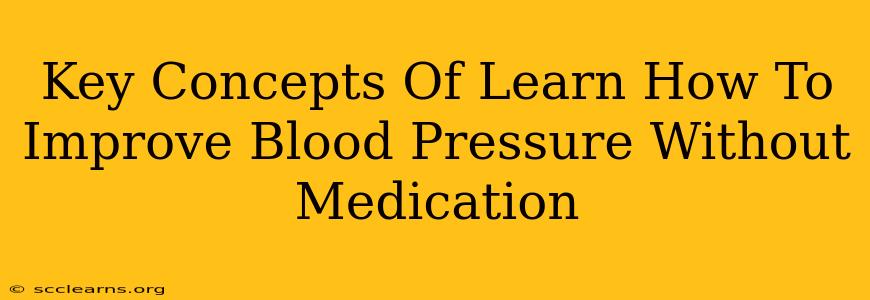High blood pressure, or hypertension, is a serious health concern affecting millions worldwide. While medication is often prescribed, many individuals seek natural ways to manage and improve their blood pressure. This article explores key concepts and lifestyle modifications that can help you lower your blood pressure without relying solely on pharmaceuticals. Always consult your doctor before making significant changes to your healthcare plan, especially if you have pre-existing conditions.
Understanding Blood Pressure
Before diving into strategies for improvement, it's crucial to understand what blood pressure is and why it matters. Blood pressure is the force of blood against your artery walls as your heart pumps blood. It's measured in millimeters of mercury (mmHg) and represented as two numbers: systolic (top number) and diastolic (bottom number). High blood pressure is generally defined as consistently reading 140/90 mmHg or higher.
Factors Affecting Blood Pressure
Numerous factors contribute to high blood pressure. Understanding these is key to developing an effective management plan:
- Diet: A diet high in sodium, saturated fats, and trans fats significantly increases blood pressure.
- Weight: Obesity and being overweight place extra strain on your heart and blood vessels.
- Physical Activity: Lack of regular exercise weakens the cardiovascular system.
- Stress: Chronic stress raises cortisol levels, which can elevate blood pressure.
- Alcohol Consumption: Excessive alcohol intake can damage the heart and blood vessels.
- Smoking: Smoking damages blood vessels and increases heart rate.
- Genetics: Family history of hypertension increases your risk.
Natural Ways to Lower Blood Pressure
Fortunately, numerous lifestyle changes can effectively lower blood pressure without medication:
1. Dietary Changes: The Cornerstone of Blood Pressure Management
- Reduce Sodium Intake: Limit processed foods, fast food, and salty snacks. Choose fresh, whole foods instead.
- Increase Potassium Intake: Potassium helps balance sodium levels. Good sources include bananas, potatoes, and spinach.
- DASH Diet: The Dietary Approaches to Stop Hypertension (DASH) diet emphasizes fruits, vegetables, whole grains, and lean protein.
- Limit Saturated and Trans Fats: These unhealthy fats raise cholesterol levels and contribute to high blood pressure.
2. Exercise Regularly: A Powerful Tool
Regular physical activity strengthens the heart and improves blood vessel function. Aim for at least 150 minutes of moderate-intensity aerobic exercise per week, such as brisk walking, swimming, or cycling.
3. Manage Stress: Mindfulness and Relaxation Techniques
Chronic stress significantly impacts blood pressure. Incorporate stress-reducing techniques into your daily routine, such as:
- Deep breathing exercises: Practicing deep, slow breaths can calm the nervous system.
- Yoga and meditation: These practices promote relaxation and reduce stress hormones.
- Spending time in nature: Connecting with nature has been shown to lower stress levels.
4. Weight Management: Achieving a Healthy BMI
Losing even a small amount of weight can significantly reduce blood pressure, especially if you're overweight or obese. Combine diet and exercise for optimal results.
5. Limit Alcohol Consumption: Moderation is Key
If you drink alcohol, do so in moderation. For men, this means no more than two drinks per day, and for women, no more than one drink per day.
6. Quit Smoking: Protect Your Cardiovascular Health
Smoking significantly increases the risk of high blood pressure and other cardiovascular diseases. Quitting is one of the best things you can do for your overall health.
Monitoring and Professional Guidance
Regularly monitoring your blood pressure is crucial. Home blood pressure monitors are readily available and allow you to track your progress. However, it's vital to consult your doctor regularly for check-ups and to discuss your blood pressure management plan. They can provide personalized advice and monitor your progress to ensure your safety and effectiveness.
Conclusion
While medication is sometimes necessary to manage high blood pressure, adopting these lifestyle changes can significantly improve your blood pressure and overall health. Remember that consistency is key. By making gradual but consistent changes, you can take control of your blood pressure and reduce your risk of serious health complications. Always consult your physician before starting any new health or wellness program.

